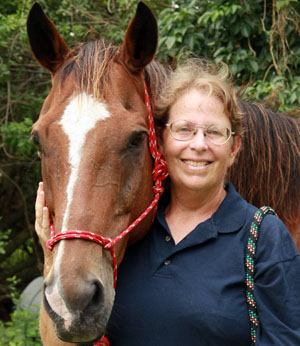TAILS FROM THE TRAILS
Some practices are so cruel that you shake your head in bewilderment and wonder, who thinks of such things?
Apparently enough people that the practice of producing nurse mare foals is fairly common. Here’s how it works.
Let’s say you own an expensive, well-bred mare, either a show horse or, more commonly, a Thoroughbred race horse you’d like to breed. If she’s a show horse, you’d like to continue competing as soon as possible, which won’t happen if the mare is nursing a foal for the next three to six months. The answer: find another mare who has recently given birth and therefore lactating, and “graft” the expensive foal onto that mare so she can raise it. But mares only produce enough milk to raise one foal at a time. So, what happens to the nurse mare’s own foal?
Then there’s the horse racing industry. Once their racing days are over, typically at the young age of three to five, Thoroughbreds who’ve raced well or come from exceptional bloodlines exist only to produce more Thoroughbreds. Unlike most other registries, the Jockey Club insists that each Thoroughbred be conceived through live cover: mare and stallion meet in the flesh; no artificial insemination.
After a mare gives birth, she needs to travel to the stallion’s farm to be rebred during the foal heat, as soon as a week to ten days after dropping her foal. Shipping a mare with a young foal is traumatic to the foal, the insurance costs prohibitive. The answer: “graft” that foal onto another mare that has recently given birth. Again, there’s that question. What happens to the nurse mare’s foal?
What happens is these less-desirable foals are unwanted byproducts of this cold-blooded custom. According to Greenhorn Horse Facts, some are killed immediately, some left to starve to death. However, their hides can be sold as “pony skin” in the fashion and textile industry, used to make shoes, purses and other high-end leather products. Some countries consider their meat a delicacy.
Not all breeders use nurse mares, nor do they all kill the extra foals. Rescuers can pay anywhere from $200 to $400 apiece for the foals, which is what Pure Thoughts Horse Rescue in Loxahatchee Groves decided to do.
“We contracted with a farmer in Kentucky and agreed to buy all his nurse mare foals this year,” co-owner Jennifer Swanson said.
Simply agreeing to take all the foals was only the beginning. These babies had to be hand-fed milk formula every three hours around the clock. This is not a job for the faint of heart nor for anyone who enjoys sleeping. The original group of 16 foals arrived in March after spending a stabilizing week in North Carolina.
“We needed a lot of volunteers, any day and time, with or without prior horse experience,” Swanson said. “These foals need to be socialized. In addition to feeding, they need to get used to leading, grooming, all sorts of things.”
The foals, of course, are incredibly cute. Almost irresistible. Charles Adkins couldn’t resist.
“I have two miniature horses and two miniature donkeys,” Adkins said. “One of my friends told me about the nurse mare foals. I came out to see them one Saturday. They were really, really cute. I talked with Jennifer and asked which one would be best for me. She showed me Lily, who’s small, very calm and gentle, eager to please. I brought her home on April 19. She’s doing fine and likes hanging out with the mini donkeys. My friend is going to help me work with her and train her. Maybe I’ll ride her one day. Right now, I just enjoy having her around.”
Zina Browning is one of Pure Thoughts’ devoted volunteers. She works with the foals Monday through Friday, 8:30 a.m. to 3:30 p.m. “I’ve become the foal herd mama.,” she said. “The babies, some of whom arrived at only a week old, stay with us four to eight weeks. Before they can go to their new homes, they have to be eating grain and hay, in addition to milk formula a couple of times a day.
When Browning first started working with them, it was overwhelming. “I didn’t know what to expect,” she said. “They melt your heart. I was fascinated to see their personalities so clearly defined even at such a young age. On the whole, they’re very trusting and easy to work with. I think they’ll do fine with their new owners. Working with them has been amazing.”
Kristin Welker of West Palm Beach is another new owner.
“I adopted Fiona in mid-April,” she said. “My dog recently passed, and I came out to Pure Thoughts to look around. The foals are so cute and sweet. Fiona came up and nuzzled me. She picked me. I’m going to keep her here, work with her, and eventually ride her. And I’m going to volunteer here, too.”
Isabella Harding of Delray Beach also volunteers. She has been helping out for a year, boards her two horses at Pure Thoughts, and also adopted a foal.
“I saw the foals when they arrived,” she said. “I adopted the first one, Scarlet. Everyone says she’s like a Wal-Mart greeter; she’s that friendly. She’s the sweetest one. She follows me and plays with me. I just love her.”
Almost all of the original group of 16 have found their new homes. “We have ten more arriving in May,” Pure Thoughts co-owner Brad Gaver said. “We know that we can’t save every nurse mare foal. We did this to save these few, and also to create awareness of this horrible practice. Rescuing a few is just a Band-Aid on the industry. Vets can induce lactation in non-pregnant mares. I’d like to see the practice of using nurse mares end.”
For more information, call (561) 951-2108 or visit www.purethoughtshorserescue.org.








